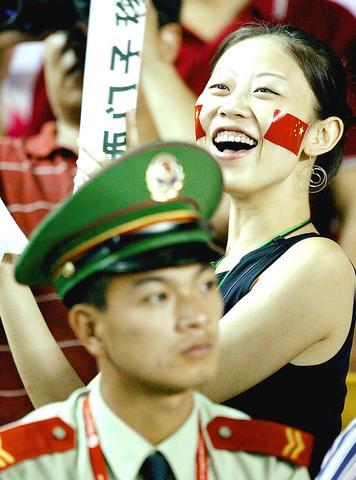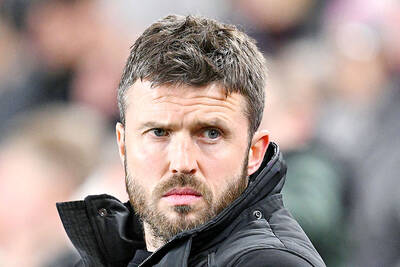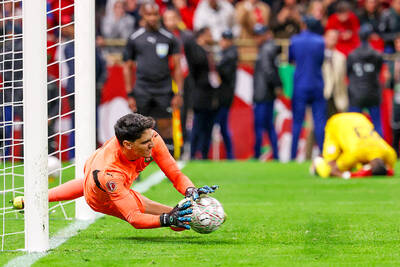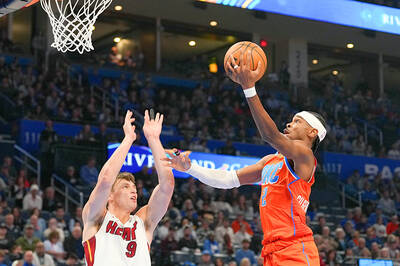From territorial claims, to war atrocities and outrage over sex orgies, tensions between China and Japan are never far from bubbling to the surface.
And now there's the boo boys at the Asian Cup, whose antics threaten to escalate into yet another diplomatic spat between the Asian giants.

PHOTO: AFP
The old adage that sport and politics don't mix falls on deaf ears in China, where niggling its neighbor about the past is jumped on at every opportunity.
When China and Japan meet in the final of Asia's most prestigious football tournament in Beijing tomorrow, there will be more at stake than lifting the silverware -- national pride will be in play.
Japan defeating China on home soil may not go down well with the hordes of rowdy fans who have heckled Japan throughout the tournament, booing their players and national anthem, still incensed over World War II atrocities.
Many Chinese believe Japan has never fully faced up to its wartime past and its brutal occupation of Chinese territory before and during World War II, and security for the big match has been stepped up with 6,000 police on duty.
It is not just the war that riles Chinese.
The two sides routinely bicker over who owns a disputed chain of islands rich in oil resources in the East China Sea.
Relations, meanwhile, took a dive last year when hundreds of Japanese tourists were implicated in an orgy with Chinese prostitutes in a south China hotel.
The three-day romp ignited a wave of anti-Japanese sentiment as it culminated on the eve of the anniversary of the start of Japan's World War II occupation of China on Sept. 18, 1931.
Many people were convinced it was timed to humiliate China.
The depth of feeling is so great that in Chongqing, Japan's team bus was rushed by an angry mob while Japanese fans had to be escorted out of the stadium by riot police.
Politicians in Tokyo have become so irked by the antics that they've issued a formal complaint to their Chinese counterparts at the highest levels, calling on them to remove politics from sport.
Japanese Foreign Minister Yoriko Kawaguchi reportedly called the booing "deplorable" while Prime Minister Junichiro Koizumi added: "It's a sports event. Why can't we just enjoy it?"
After days of silence, China yesterday asked its fans to behave, while also using the opportunity to have a dig at the Japanese media.
"We hope the Chinese and Japanese football fans will enjoy a wonderful match ... with good behavior," said foreign ministry spokesman Kong Quan, while saying it was "regrettable" that some Japanese media had linked the booing with politics.
Japan Football Association President Saburo Kawabuchi meanwhile announced he would now attend the match after initially not planning the trip.
"It is not desirable if the top man of the Japanese association is not present when the country is through to the final," he said.
With the final being broadcast live around the world, the Asian Football Confederation is conscious the fans' behavior does not bode well for the image of the game.
"I hope the Chinese team will be well supported but at the same time, I am hoping that the China fans give the Japanese the same sort of treatment," said AFC general secretary Peter Velappan.
"We all know Japan's fans were not the most welcomed in Chongqing but we are advocating fair play at the Asian Cup. Every team has the right to compete on common ground so let's finish the tournament on a real high."
Japan's captain Tsuneyasu Miyamoto has no doubt that anti-Japanese feelings will be running high in Beijing.
"They booed only at the start of our national anthem this time," said Miyamoto after their semi-final against Bahrain in Jinan.
"However, they were still against us and I did feel the same sort of atmosphere as we had in Chongqing. But it will be nothing compared to that if we play against China in Beijing."
Japanese questions
Japanese media questioned if China was fit to host the 2008 Olympics yesterday in view of Chinese fans' hostility towards Japan's soccer team at the Asian Cup.
Beijing, meanwhile, promised to take steps to protect Japanese players and fans at tomorrow's final, in which Japan plays against China.
The media comments came after China's Foreign Ministry urged soccer fans to be well-behaved, but also criticized Japan's media for linking the matches to politics.
Japan's national side have faced hostile crowds in all their matches so far. Some Chinese fans carried banners reading "Looking into history, apologize to Asia people," a reference to Japan's military aggression before and during World War II.
After Japan beat Thailand on July 24, Chinese fans converged on the Japan team bus, forcing it to depart without two players.
Resentment against Japan lingers in China over its aggression before and during World War II, despite ever-closer economic ties, and Prime Minister Junichiro Koizumi has fuelled the anger with his annual visits to a Tokyo shrine where war criminals are honored along with other war dead.
Several Japanese papers devoted editorials to the topic.
"Saturday's final match between Japan and China will test whether the country and its people are really ready to host the Olympic Games," the conservative Yomiuri Shimbun daily said.
Chinese Foreign Ministry spokesman Kong Quan urged fans to behave on Wednesday but also criticized Japan's media.
"But it must also be pointed out that some Japanese media have stirred up and exaggerated the behavior of a few people, and even linked this with politics," Kong said in a statement on the ministry's Web site (www.fmprc.gov.cn).
"We express our regret at this."
Japan's liberal Asahi Shimbun newspaper pointed to historical reasons for Chinese resentment.
But the newspaper criticized the Chinese fans' behavior as immature and inappropriate for a sports event.
"What we want them not to forget is that the final on Saturday [tomorrow] will be an opportunity to test the magnanimity of the Chinese people for the Olympics four years hence," it said.
Koizumi raised the issue when outgoing Chinese ambassador to Japan Wu Dawei made a courtesy call yesterday.
Koizumi said he hoped the final would be a good match in a spirit of sportsmanship and that the peoples of both countries could enjoy it, Japan's Foreign Ministry said in a statement.
Wu replied that China, as host country, would take necessary steps so Japan need not worry.
Security alert
Asian Cup security will be on a heightened state of alert for tomorrow's final between bitter rivals China and Japan in Beijing.
More than 6,000 security officials will be deployed, including riot police, soldiers and SWAT teams for a potentially explosive game full of historical and political overtones.
"We have advised security staff to take extra care for the Japanese team and fans," said Peter Velappan, general secretary of the Asian Football Confederation (AFC.
"Japanese fans will be seated together in a special marked area and given extra protection from police in plain clothes to make sure there are no missiles thrown."
There is still lingering resentment in China over Japan's military invasion and brutal occupation of parts of the country from 1931 to 1945.
As a result, the Japan team has been booed relentlessly during the Asian Cup, their team bus even being rushed by hordes of Chinese fans after one match.
"As it is China against Japan there will be a very high level of security inside and outside the stadium," Velappan said.
"Japanese fans have not been encouraged to come to China but we have been assured they will be safe and secure."
Extra security has also been laid on for the Japan squad in and around their Beijing hotel, with tough screening measures in place.
At least 2,000 Japanese fans are expected to have tickets for the final in Beijing. The venue holds 65,000.
But Velappan was anxious to play down fears of crowd trouble, insisting the 1,000 extra security officials called in for the final were purely a precaution.
Media frenzy
The Asian Cup final between China and Japan is set to be beamed into more than 500 million homes throughout Asia, the Middle East and for the first time, Europe.
"The final on Saturday [tomorrow] will be beamed into more than 500 million homes and is expected to set a viewing record for Asian football," said Mark Hardess, Senior Vice-President of Singapore-based World Sport Television.
All 32 matches of Asia's football showpiece, which kicked off on July 17, have been screened by Chinese broadcaster CCTV.
Games have been relayed to scores of free-to-air networks and satellite channels including the pan-Asian ESPN Star Sports.
And for the first time in the history of the tournament, the final will be broadcast live in Europe with Eurosport beaming to around 95 million households.
Altogether 26 broadcasters will televise the match as Japan seek to defend their title against a Chinese team looking for their first ever Asian Cup crown.

Manchester United on Tuesday confirmed Michael Carrick as interim manager until the end of the season, tasking him with leading the Red Devils back into the UEFA Champions League. “Having the responsibility to lead Manchester United is an honor,” said Carrick, 44, who won 12 major trophies in his 12-year playing career at United. The former midfielder previously had an unbeaten three-game stint as caretaker boss at Old Trafford in 2021. Carrick then took on his first permanent managerial role at second-tier Middlesbrough in October 2022 and was sacked in June last year after the club finished 10th in the

Dallas Mavericks rookie Cooper Flagg on Wednesday was ruled out for the second half of their 118-109 loss to the Denver Nuggets after the No. 1 pick sprained his left ankle in the first half. Flagg was called for a foul while defending against Peyton Watson and turned the ankle as he fell to the floor with 6 minutes, 1 second left in the second quarter. Flagg limped to the bench and continued to the locker room, but returned for the final 2 minutes, 35 seconds before the break. The 19-year-old did not come out for the second half before the announcement that

Yassine Bounou on Wednesday saved two penalties, while Youssef en-Nesyri netted the decisive spot-kick as hosts Morocco secured a 4-2 shoot-out victory over Nigeria following a 0-0 draw in a tense Africa Cup of Nations semi-final in Rabat. Morocco, seeking their first continental title in 50 years, are to face 2021 winners Senegal in Sunday’s decider in Rabat, while Nigeria take on Egypt in the third-place playoff tomorrow. The 120 minutes before the shoot-out had few clear-cut chances for either side, but it was Morocco who created more opportunities, although they were denied by some fine saves from Nigeria goalkeeper Stanley Nwabali. Nigeria

Reigning NBA Most Valuable Player Shai Gilgeous-Alexander on Sunday sparked defending champions Oklahoma City to victory, while Anthony Edwards led Minnesota’s last-minute fightback to beat San Antonio. Gilgeous-Alexander scored 29 points while adding eight assists and five rebounds in the Thunder’s 124-112 home victory over Miami, improving the NBA’s best record to 33-7 after outscoring the Heat 70-53 in the second half. “We locked in defensively. We were finally able to get some stops,” Thunder guard Aaron Wiggins said. “We were able to get out in transition a little bit, get going offensively and find the flow.” Jalen Williams scored 18 points, while